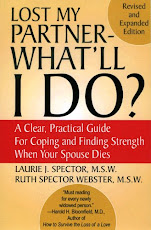
In Part 2 of these excerpts from Lost My Partner – What’ll I Do?, we suggested ways you could relieve yourself of some of the guilt you and your family may struggle with as a result of your partner’s suicide.
Here are additional important points to consider:
1) Children tend to blame themselves when a parent dies, even though they may not express it openly or be aware of it themselves. Recognizing this can be difficult, because, unlike most adults, children show they’re upset by their behavior, rather than by talking. A child may especially prone to self-blame, in the case of suicide. Children need to be given simple, truthful explanations of what has happened. It’s best to tell them how it happened, or they will fantasize about all sorts of frightening possibilities. Consider having your child/children work with a mental health professional to deal with this trauma.
2) Because it’s common for family members to blame the surviving spouse for either causing or not preventing the suicide, it’s helpful to talk about your feelings with supportive people outside your family. Join a specialized support group, if there is one available. The American Association of Suicidology (suicidology.org), provides information to survivors about support groups, books and specialists. Also check out Survivors of Suicide Loss (soslsd.org) for support options.
IMPORTANT REMINDER: If you or someone you know is seriously thinking about taking his/her own life, tell someone immediately! Call the Operator to reach your local suicide hotline and/or go to suicidepreventionlifeline.org to talk to a trained telephone counselor 24/7.

No comments:
Post a Comment